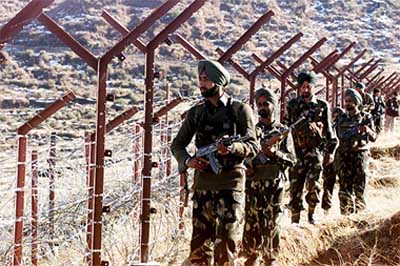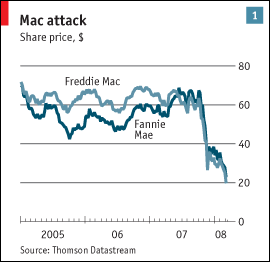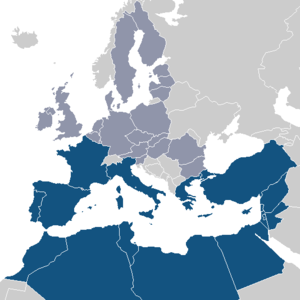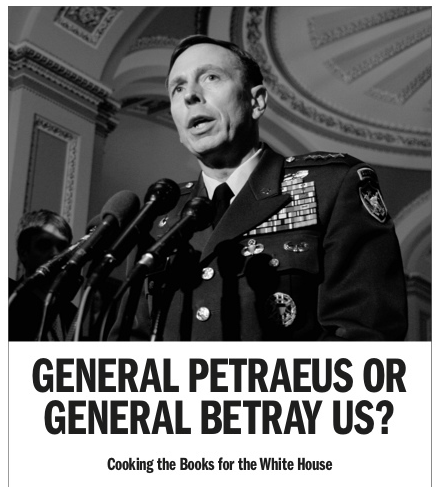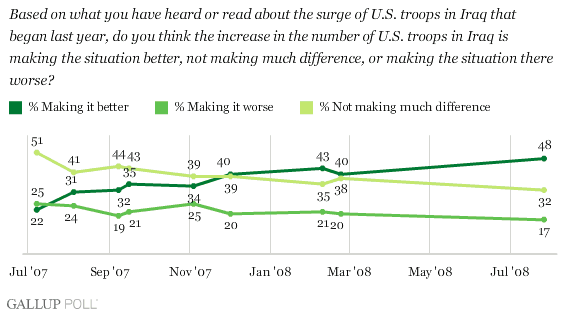Staff Sgt. Faoa L. Apineru died of a wound suffered on July 2. If this holds (barring some terrible event today or wounded soldiers dying later), it would be a death toll less than 2/3 of the previously lowest month in Iraq (May: 19 deaths). So the by-far two lowest death tolls since the beginning of the war have been in the past 3 months, and this most recent one has come after the end of the surge.
Recorded Iraqi deaths are also at an all-time low: 393 (lower only than June, at 450, which was lower only than May, at 506). A pattern is emerging, and it's one of steadily, reliably increasing security and safety.
It is thus time to face a simple fact down a dark alley that most of us have been trying to avoid: The Surge worked, General Petraeus is not an unpatriotic, treasonous Bush lackey, and the Iraq war is winnable.
Now, Mr. Obama's campaign boat has a lot of wind behind its sails right now, because even Mr. McCain is agreeing to the sixteen-month timetable for withdrawal. This vindicates Mr. Obama, right? He was right all along?
No, not at all. Mr. Obama has spent the entire surge saying that it was not working. In July, his website was smart enough to remove his consistent, zealous opposition to the Surge from their Iraq
 page, but he has not come out to say that it has worked. Does he still think that it hasn't? Or is he simply as stick-to-your-guns consistent in his ideological stances as Mr. Bush?
page, but he has not come out to say that it has worked. Does he still think that it hasn't? Or is he simply as stick-to-your-guns consistent in his ideological stances as Mr. Bush?Mr. Obama has not only opposed the surge since the beginning, but his 16-month withdrawal plan came around not because of successes in Iraq. His withdrawal plan has been the same, from the absolute worst conditions in Iraq (in 2006 when the violence was over 10 times what it is now) to today. The 16-month timetable was a strategy for easy defeat, not one for actually winning. But, quite luckily for Mr. Obama, he was wrong about the surge. His being wrong about the surge makes his 16-month timetable look entirely reasonable, as long as you are not willing to think about it too hard.
Unfortunately for the future of US foreign policy, Obama's political stars-and-moons lining up is nothing but luck, and has absolutely nothing to do with his ability to make judgments and decisions as Commander in Chief. He was wrong--and still is wrong--about the Surge, and his being wrong about the Surge is the only reason his years-old 16-month withdrawal timetable looks like anything more than a bloody white flag strategy. His policies and stances have not changed at all, regardless of wildly
 varying conditions in Iraq. This would mean an even more inflexible and ideological foreign policy than that of Mr. Bush, who was at least smart enough to consider Mr. Petraeus' plan for changing strategies.
varying conditions in Iraq. This would mean an even more inflexible and ideological foreign policy than that of Mr. Bush, who was at least smart enough to consider Mr. Petraeus' plan for changing strategies. But, even more unfortunately for the future of US foreign policy is that the McCain campaign camp is completely incompetent, and will not be able to capitalize on this glaring flaw in Mr. Obama's shining moment. If they can't, then Mr. Obama will win this election, and the American people will spend at least four years knowing that they truly had no idea what they meant when they spent the last 8 years complaining about idealistic and inflexible foreign policy. I have yet to see an Obama foreign policy point that shows any shred of good judgment or consideration for earthly realities, particularly in regards to military matters.

